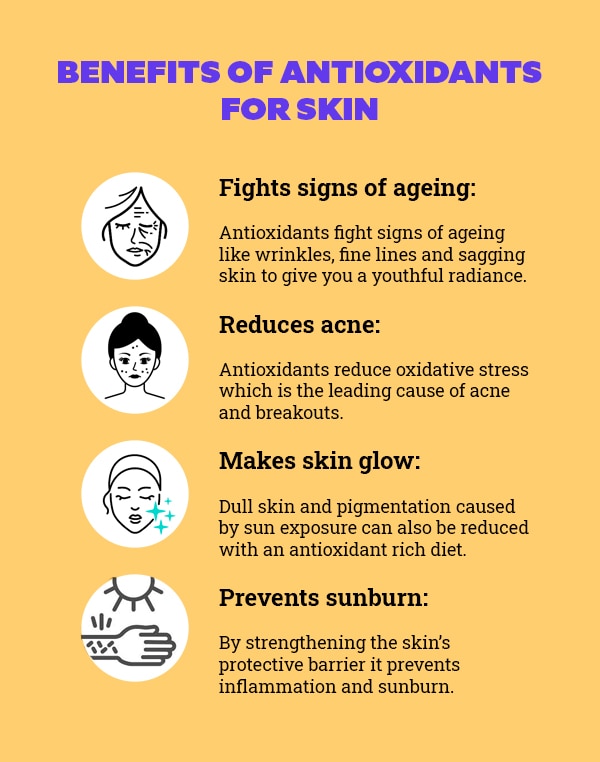Imagine a world without antioxidants. The bright colors and delicious flavors of fruits and vegetables would vanish, leaving behind a dull and lifeless landscape. But fear not, because antioxidants are here to save the day! These powerful compounds have been gaining popularity for their numerous health benefits, from boosting your immune system to preventing chronic diseases. In this article, we will explore the fascinating world of antioxidants and why they are essential for a healthy lifestyle. So grab a cup of green tea and get ready to discover the incredible benefits of antioxidants!
Overview of Antioxidants
Antioxidants are substances that can help protect your body from harmful molecules called free radicals. Free radicals are unstable molecules that can damage cells and contribute to various health problems, including aging and chronic diseases. Antioxidants work by neutralizing these free radicals and preventing them from causing harm.
Definition of Antioxidants
Antioxidants are compounds that can inhibit oxidation, a chemical reaction that produces free radicals. They can neutralize these free radicals and protect your body from their damaging effects. Some common antioxidants include vitamins C and E, beta-carotene, and various minerals such as selenium and zinc.
Types of Antioxidants
There are several types of antioxidants, each with its own unique properties and benefits. Some of the most well-known antioxidants include:
-
Vitamin C: This water-soluble vitamin is a powerful antioxidant that helps boost your immune system and protect cells from damage.
-
Vitamin E: This fat-soluble vitamin plays a key role in protecting cell membranes from oxidative damage.
-
Beta-carotene: This pigment found in fruits and vegetables is converted into vitamin A in the body and has antioxidant properties.
-
Selenium: This mineral acts as a cofactor for certain antioxidant enzymes and helps defend against oxidative stress.
How Antioxidants Work
Antioxidants work by donating electrons to free radicals, neutralizing their harmful effects. When a free radical steals an electron from a molecule in your body, it can cause damage to cells and DNA. Antioxidants have the ability to stabilize these free radicals by providing them with the missing electron, preventing further damage.
Role of Antioxidants in Health
Antioxidants play a crucial role in maintaining good health and protecting your body from various diseases and conditions. Here are some of the key benefits of antioxidants:
Protection against Oxidative Stress
Oxidative stress occurs when there is an imbalance between free radicals and antioxidants in your body. This can lead to cell damage and contribute to the development of chronic diseases such as cancer, heart disease, and diabetes. Antioxidants help reduce oxidative stress by neutralizing free radicals and preventing cellular damage.
Slowing Down Aging Process
Free radicals can accelerate the aging process by damaging cells and DNA. Antioxidants help slow down the aging process by protecting against oxidative stress and reducing the damage caused by free radicals. This can result in healthier skin, improved cognitive function, and enhanced overall well-being.
Reducing Risk of Chronic Diseases
Numerous studies have shown that a diet rich in antioxidants can help reduce the risk of chronic diseases such as heart disease, cancer, and neurodegenerative disorders. Antioxidants can help protect against the development of these diseases by neutralizing free radicals and reducing inflammation in the body.
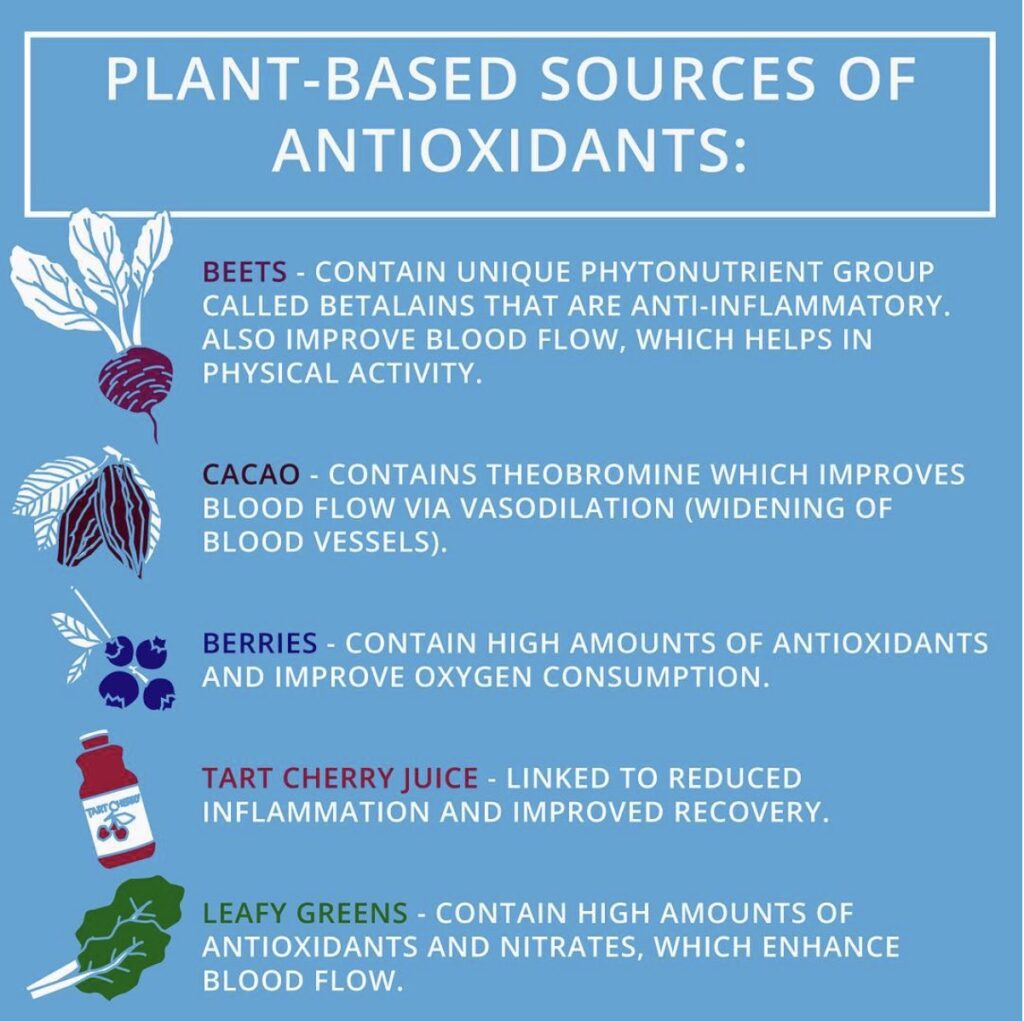
This image is property of switch4good.org.
Food Sources of Antioxidants
Including antioxidant-rich foods in your diet is essential for reaping the benefits of these powerful compounds. Here are some excellent food sources of antioxidants:
Fruits and Berries
Fruits such as berries, oranges, grapes, and pomegranates are packed with antioxidants. These fruits are rich in vitamin C, which is a potent antioxidant that helps protect against cellular damage and boosts the immune system. Blueberries, in particular, are known for their high antioxidant content and have been shown to improve memory and cognitive function.
Vegetables
Dark leafy greens like spinach and kale, as well as other colorful vegetables like peppers, carrots, and tomatoes, are excellent sources of antioxidants. These vegetables are rich in vitamins A, C, and E, as well as other antioxidants like beta-carotene and lycopene. Including a variety of vegetables in your diet can help provide a wide range of antioxidants to support your overall health.
Nuts and Seeds
Nuts and seeds, such as almonds, walnuts, flaxseeds, and chia seeds, are not only a great source of healthy fats and protein but also contain antioxidants. These antioxidant-rich foods help reduce inflammation and protect against oxidative stress. Incorporating a handful of nuts or sprinkling seeds onto salads or smoothies is an easy way to boost your antioxidant intake.
Key Antioxidants and Their Benefits
Certain antioxidants stand out for their unique benefits and roles in maintaining good health. Here are a few key antioxidants and their specific benefits:
Vitamin C
Vitamin C is a powerful antioxidant that boosts your immune system, promotes collagen formation, and helps protect against common infections. It also plays a crucial role in managing stress levels and supporting mental health.
Vitamin E
Vitamin E is essential for maintaining healthy skin, as it helps protect against UV radiation from the sun. It also supports heart health by reducing the risk of cardiovascular diseases and aids in the prevention of cognitive decline.
Beta-carotene
Beta-carotene, a precursor to vitamin A, is known for its role in promoting good vision. It helps protect against age-related macular degeneration and cataracts. Beta-carotene also acts as a powerful antioxidant, neutralizing free radicals and supporting overall immune function.
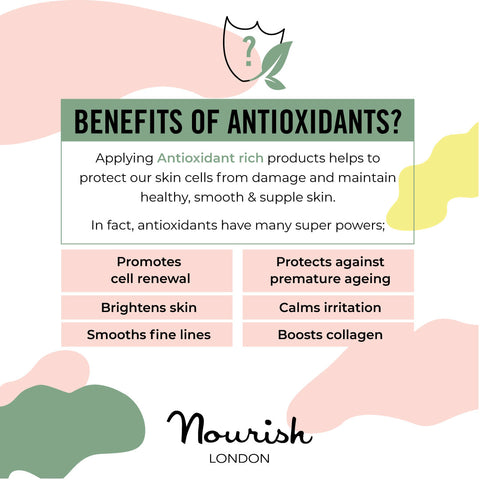
This image is property of cdn.shopify.com.
Improving Immune Function
Antioxidants play a significant role in supporting a healthy immune system. Here’s how they contribute to improving immune function:
Boosting the Immune System
High levels of oxidative stress can weaken the immune system and increase susceptibility to infections. Antioxidants help reduce oxidative stress, allowing the immune system to function optimally. Vitamin C, in particular, has been found to enhance immune cell function and shorten the duration of common infections like the common cold.
Reducing the Risk of Infections
Certain antioxidants, such as vitamin E and selenium, have been shown to have antimicrobial properties, preventing the growth of harmful bacteria and viruses. Including foods rich in these antioxidants can help reduce the risk of infections and support overall immune health.
Promoting Heart Health
Antioxidants have been linked to numerous benefits for heart health. Here’s how antioxidants support a healthy heart:
Lowering Cholesterol Levels
Oxidized low-density lipoproteins (LDL) are a major risk factor for heart disease. Antioxidants, including vitamin E and beta-carotene, help prevent the oxidation of LDL cholesterol, reducing the risk of plaque formation in the arteries. This, in turn, lowers the risk of heart disease and improves overall cardiovascular health.
Preventing Plaque Buildup in Arteries
Plaque buildup in the arteries can lead to atherosclerosis, a condition characterized by narrowed and hardened arteries. Antioxidants help protect against this process by reducing inflammation and oxidative stress. Including antioxidant-rich foods as part of a heart-healthy diet can help maintain optimal heart function and reduce the risk of cardiovascular diseases.
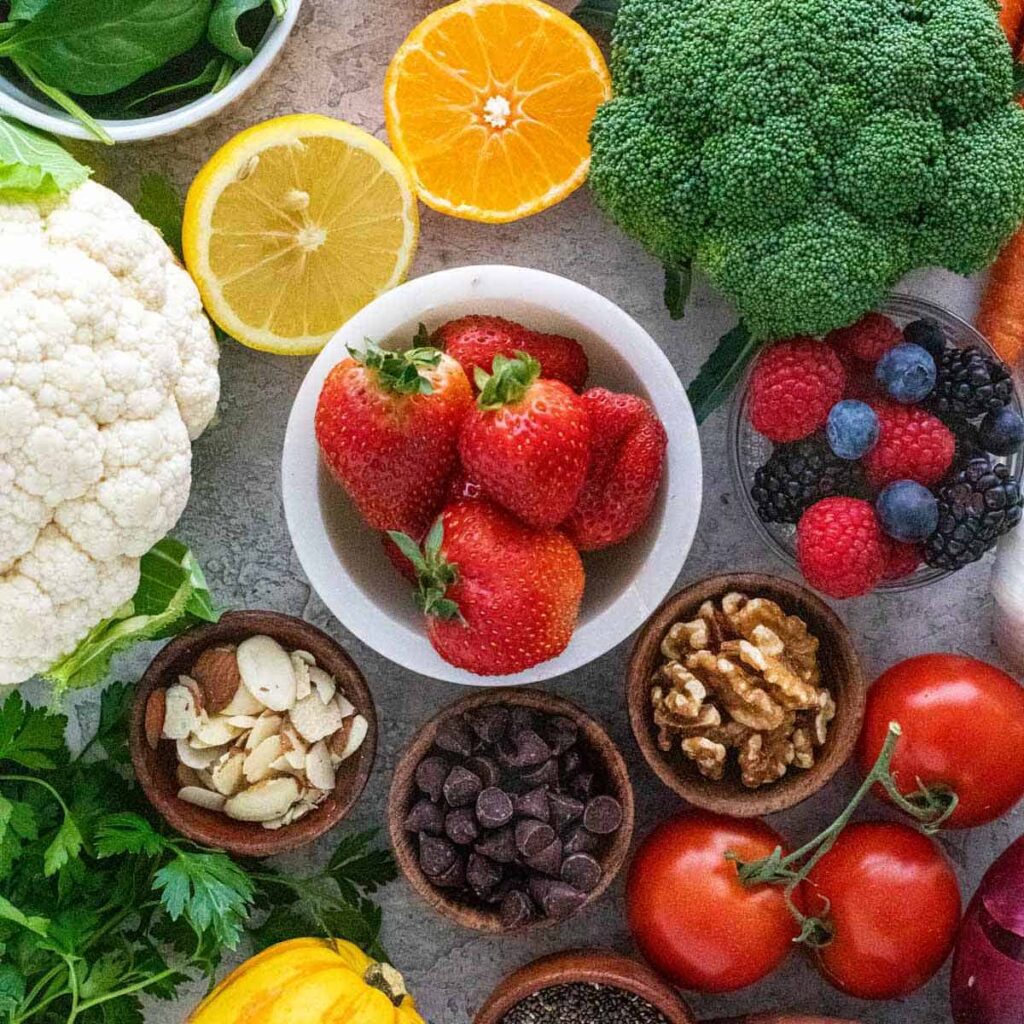
This image is property of www.jessicagavin.com.
Protecting Eye Health
Antioxidants play a vital role in maintaining healthy eyes and reducing the risk of age-related eye diseases. Here’s how antioxidants protect eye health:
Reducing the Risk of Age-Related Macular Degeneration
Age-related macular degeneration (AMD) is a leading cause of vision loss among older adults. Antioxidants, especially lutein and zeaxanthin found in dark leafy greens and yellow-orange fruits and vegetables, help protect against AMD by filtering harmful blue light and reducing oxidative stress in the eyes.
Preventing Cataracts
Cataracts occur when the lens of the eye becomes cloudy, causing blurred vision. Antioxidants, such as vitamin C and vitamin E, help protect the lens from oxidative damage, reducing the risk of cataract development. Including foods rich in these antioxidants can help support long-term eye health and prevent vision problems.
Supporting Brain Function
Antioxidants have shown promise in promoting brain health and reducing the risk of neurodegenerative diseases. Here’s how antioxidants support brain function:
Enhancing Cognitive Function
Oxidative stress and inflammation in the brain can contribute to cognitive decline and neurodegenerative diseases like Alzheimer’s and Parkinson’s. Antioxidants help combat these effects by neutralizing free radicals and reducing inflammation. Regular consumption of antioxidant-rich foods, such as berries and leafy greens, may help support cognitive function and protect against age-related decline.
Reducing the Risk of Neurodegenerative Diseases
Studies have suggested that a diet rich in antioxidants may help reduce the risk of neurodegenerative diseases. Antioxidants like vitamin E and flavonoids found in berries and citrus fruits have been shown to have neuroprotective effects, preserving brain health and reducing the risk of diseases like Alzheimer’s and dementia.
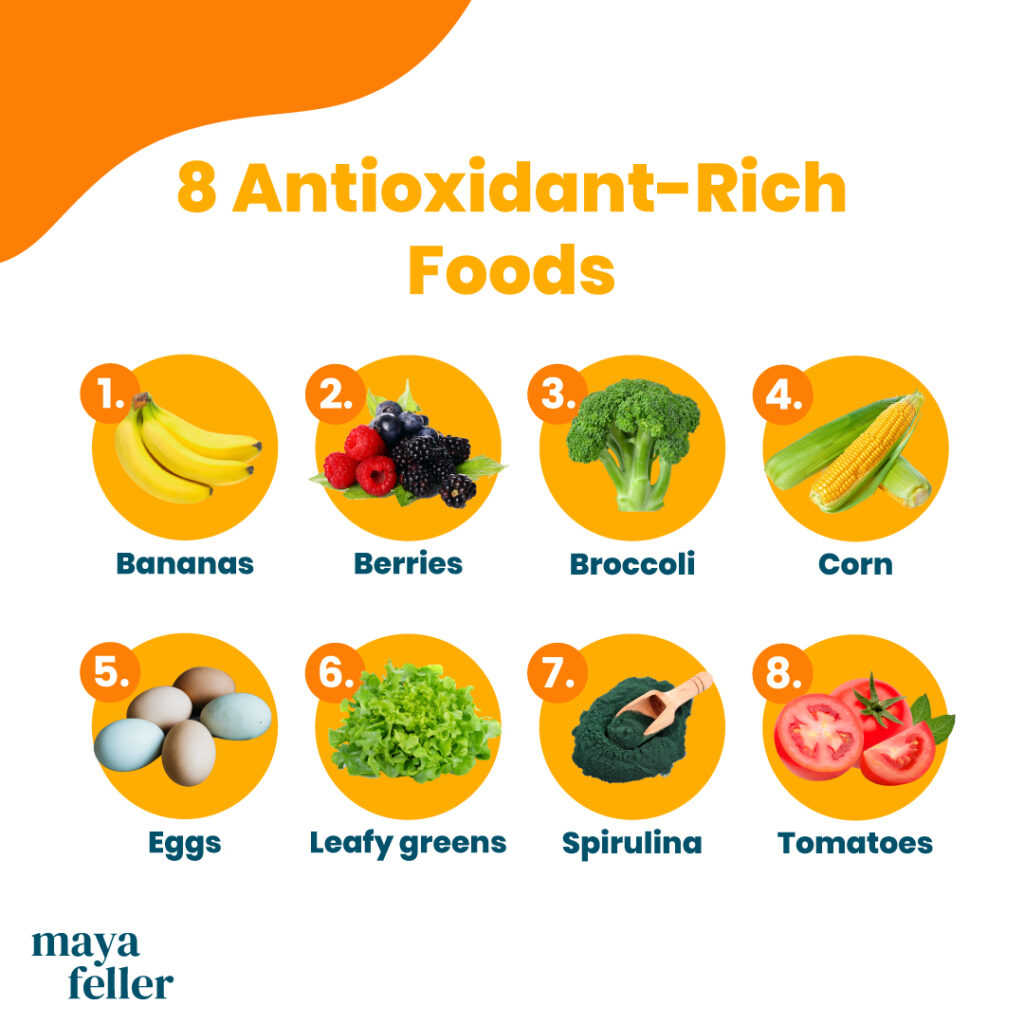
This image is property of mayafellernutrition.com.
Skin Benefits of Antioxidants
Antioxidants are often hailed for their skin benefits. Here’s how antioxidants can contribute to maintaining healthy and youthful-looking skin:
Fighting Skin Aging
The damaging effects of free radicals can accelerate skin aging, causing wrinkles, fine lines, and loss of elasticity. Antioxidants help combat this by neutralizing free radicals and preventing oxidative stress in the skin. Vitamin C, vitamin E, and beta-carotene are particularly effective in boosting collagen production and reducing signs of aging.
Minimizing Damage from UV Radiation
Exposure to UV radiation from the sun can lead to skin damage, including sunburn, pigmentation, and the formation of free radicals. Antioxidants like vitamin C and vitamin E help protect against UV-induced damage by absorbing harmful UV rays and neutralizing free radicals. Including antioxidant-rich foods in your diet and using topical antioxidant-rich skincare products can help protect your skin from the harmful effects of sun exposure.
Exercise Performance and Recovery
Antioxidants can also play a role in improving exercise performance and supporting muscle recovery. Here’s how they contribute to these processes:
Reducing Exercise-Induced Oxidative Stress
Intense exercise can lead to an increase in free radicals and oxidative stress in the body. Antioxidants help reduce exercise-induced oxidative stress by neutralizing free radicals and minimizing cellular damage. This can result in improved exercise performance and a faster recovery process.
Enhancing Muscle Recovery
Oxidative stress can delay muscle recovery and lead to muscle damage. Antioxidants, such as vitamin C and vitamin E, help reduce muscle inflammation and support the repair process. Including antioxidant-rich foods in your post-workout meals or taking antioxidant supplements can aid in muscle recovery and optimize exercise benefits.
In conclusion, antioxidants play a vital role in maintaining good health and protecting against various diseases and conditions. Including a variety of antioxidant-rich foods in your diet can support your overall well-being and promote longevity. Whether you’re looking to improve your immune function, support heart health, protect your eyes and brain, or enhance your skin’s appearance, antioxidants are a powerful tool to incorporate into your lifestyle. So, make sure to prioritize antioxidants in your diet and reap the numerous benefits they have to offer.
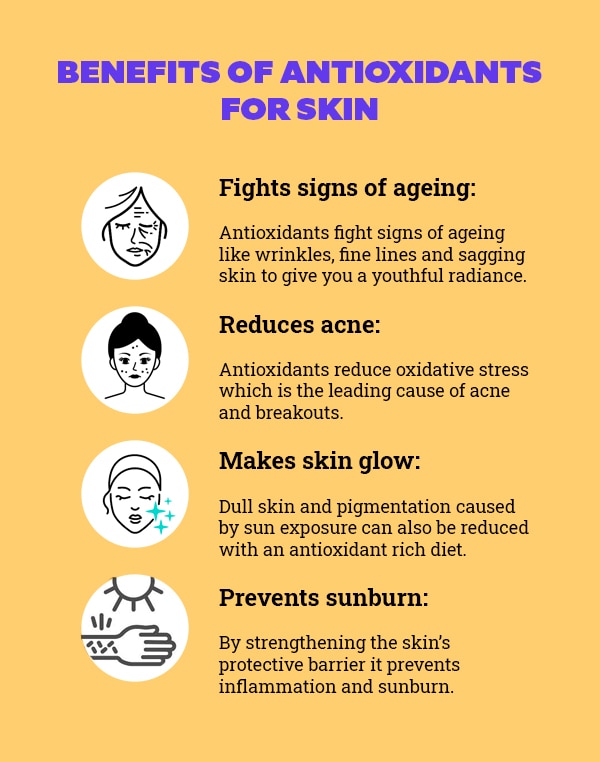
This image is property of static-bebeautiful-in.unileverservices.com.

